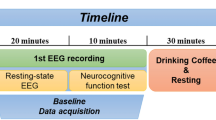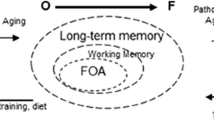Abstract
The growing body of evidence indicates that habitual coffee consumption has beneficial effects on brain functions in older adults, but its effects on different aspects of cognitive function are relatively unknown. We analyzed data of 104 elderly men and women to investigate the effects of habitual coffee consumption on attention and memory with respect to participants’ professional intellectual workload (scientists vs. people not engaged in professional scientific activity) and sex. The volunteers completed the Attention Network Test (ANT), the recognition test for geometric figures and syllables, and the test for memorization of dichotically presented words. The ANT test showed that coffee consumption only influenced the alertness system scores and was associated with a decreased number of errors in trials with no warning signal. Coffee consumers also demonstrated higher retrieval of words presented in dichotic listening task; however, only in the group not engaged in professional scientific activity. Recognition memory was not associated with coffee consumption. No tests showed gender-related effects. This study provides evidence that in older adults, the effect of habitual coffee consumption appears task-specific and may be most advantageous in subjects with lower intellectual workload.

Similar content being viewed by others
REFERENCES
Wu, L., Sun, D., and He, Y., Coffee intake and the incident risk of cognitive disorders: a dose-response meta-analysis of nine prospective cohort studies, Clin. Nutr., 2017, vol. 36, no. 3, p. 730.
Nehlig, A., Effects of coffee/caffeine on brain health and disease: What should I tell my patients? Pract. Ne-urol., 2016, vol. 16, no. 2, p. 89.
Chen, J.F. and Schwarzschild, M.A., Do caffeine and more selective adenosine A2A receptor antagonists protect against dopaminergic neurodegeneration in Parkinson’s disease? Parkinsonism Relat. Disord., 2020, vol. 80, suppl. 1, p. S45.
Kolahdouzan, M. and Hamadeh, M.J., The neuroprotective effects of caffeine in neurodegenerative diseases, CNS Neurosci. Ther., 2017, vol. 23, no. 4, p. 272.
Renouf, M., Marmet, C., Giuffrida, F., et al., Dose-response plasma appearance of coffee chlorogenic and phenolic acids in adults, Mol. Nutr. Food Res., 2014, vol. 58, no. 2, p. 301.
Dodd, F.L., Kennedy, D.O., Riby, L.M., and Haskell-Ramsay, C.F., A double-blind, placebo-controlled study evaluating the effects of caffeine and l-theanine both alone and in combination on cerebral blood flow, cognition and mood, Psychopharmacology, 2015, vol. 232, no. 14, p. 2563.
Zupo, R., Griseta, C., Battista, P., et al., Role of plant-based diet in late-life cognitive decline: results from the Salus in Apulia Study, Nutr. Neurosci., 2021, vol. 15, p. 1.
Fisicaro, F., Lanza, G., Pennisi, M., et al., Moderate mocha coffee consumption is associated with higher cognitive and mood status in a non-demented elderly population with subcortical ischemic vascular disease, Nutrients, 2021, vol. 13, no. 2, p. 536.
Körver, S., van de Schraaf, S.A.J., Geurtsen, G.J., et al., The Mini Mental State Examination does not accurately screen for objective cognitive impairment in Fabry disease, JIMD Rep., 2019, vol. 48, no. 1, p. 53.
Pasman, W.J., Boessen, R., Donner, Y., et al., Effect of caffeine on attention and alertness measured in a home-setting, using web-based cognition tests, JMIR Res. Protoc., 2017, vol. 6, no. 9, p. 169.
Fan, J. and Posner, M., Human attentional networks, Psychiatr. Praxis, 2004, vol. 2, p. 210.
Petersen, S.E. and Posner, M.I., The attention system of the human brain: 20 years after, Annu. Rev. Neurosci., 2012, vol. 35, p. 73.
Xiao, M., Ge, H., Khundrakpam, B.S., et al., Attention performance measured by attention network test is correlated with global and regional efficiency of structural brain networks, Front. Behav. Neurosci., 2016, vol. 10, p. 194.
Witte, E.A. and Marrocco, R.T., Alteration of brain noradrenergic activity in rhesus monkeys affects the alerting component of covert orienting, Psychopharmacology (Berlin), 1997, vol. 132, no. 4, p. 315.
Davidson, M.C. and Marrocco, R.T., Local infusion of scopolamine into intraparietal cortex slows covert orienting in rhesus monkeys, J. Neurophysiol., 2000, vol. 83, no. 3, p. 1536.
Ott, T. and Nieder, A., Dopamine and cognitive control in prefrontal cortex, Trends Cognit. Sci., 2019, vol. 23, no. 3, p. 213.
Volf, N.V., Bazovkina, D.V., and Kulikov, A.V., The 5-HTTLPR polymorphism of the serotonin transporter gene and the intellectual environment of work activity as factors associated with changes to memory in aging, Neurosci. Behav. Physiol., 2019, vol. 49, no. 6, p. 651.
Volf, N.V., Privodnova, E.Yu., and Belousova, L.V., The impact of the intellectual environment of professional activities on creative capacity at aging: peculiaritiesof associations with characteristicsof attention and intelligence, Zh. Vyssh. Nervn. Deyat. im. I.P. Pavlova, 2019, vol. 69, no. 1, p. 51.
López-Higes, R., Martín-Aragoneses, M.T., Rubio-Valdehita, S., et al., Efficacy of cognitive training in older adults with and without subjective cognitive decline is associated with inhibition efficiency and working memory span, not with cognitive reserve, Front. Aging Neurosci., 2018, vol. 10, p. 23.
Arab, L., Biggs M.L., O’Meara, E.S., et al., Gender differences in tea, coffee, and cognitive decline in the elderly: the cardiovascular health study, J. Alzheimer’s Dis., 2011, vol. 27, no. 3, p. 553.
Stern, Y., Cognitive reserve, Neuropsychologia, 2009, vol. 47, no. 10, p. 2015.
Fan, J., McCandliss, B.D., Sommer, T., et al., Testing the efficiency and independence of attentional networks, J. Cognit. Neurosci., 2002, vol. 14, no. 3, p. 340.
Hameleers, P.A., van Boxtel, M.P., Hogervorst, E., et al., Habitual caffeine consumption and its relation to memory, attention, planning capacity and psychomotor performance across multiple age groups, Hum. Psychopharmacol., 2000, vol. 15, no. 8, p. 573.
Fan, J., Gu, X., Guise, K.G., et al., Testing the behavioral interaction and integration of attentional networks, Brain Cognit., 2009, vol. 70, no. 2, p. 209.
Dehaene, S., The error-related negativity, self-monitoring, and consciousness, Perspect. Psychol. Sci., 2018, vol. 13, no. 2, p. 161.
Hyman, J.M., Holroyd, C.B., and Seamans, J.K., A novel neural prediction error found in anterior cingulate cortex ensembles, Neuron, 2017, vol. 95, no. 2, p. 447.
Kiehl, K.A., Liddle, P.F., and Hopfinger, J.B., Error processing and the rostral anterior cingulate: an event-related fMRI study, Psychophysiology, 2000, vol. 37, no. 2, p. 216.
Nasser, H.M., Calu, D.J., Schoenbaum, G., and Sharpe, M.J., The dopamine prediction error: contributions to associative models of reward learning, Front. Psychol., 2017, vol. 8, p. 244.
Grace, A.A., The tonic/phasic model of dopamine system regulation: Its relevance for understanding how stimulant abuse can alter basal ganglia function, Drug Alcohol Depend., 1995, vol. 37, no. 2, p. 111.
Daly, J.W., Shi, D., Nikodijevic, O., and Jacobson, R.A., The role of adenosine receptors in the central action of caffeine, Pharmacopsychoecologia, 1994, vol. 7, no. 2, p. 201.
Solinas, M., Ferre, S., You, Z.B., et al., Caffeine induces dopamine and glutamate release in the shell of the nucleus accumbens, J. Neurosci., 2002, vol. 22, no. 15, p. 6321.
Frewer, L.J. and Lader, M., The effects of caffeine on two computerized tests of attention and vigilance, Hum. Psychopharmacol., 1991, vol. 6, p. 119.
Haskell, C.F., Kennedy, D.O., Wesnes, K.A., and Scholey, A.B., Cognitive and mood improvements of caffeine in habitual consumers and habitual non-consumers of caffeine, Psychopharmacology, 2005, vol. 179, no. 4, p. 813.
Araújo, L.F., Giatti, L., Reis, R.C., et al., Inconsistency of association between coffee consumption and cognitive function in adults and elderly in a cross-sectional study (ELSA-Brazil), Nutrients, 2015, vol. 7, no. 11, p. 9590.
Iranpour, S., Saadati, H.M., Koohi, F., and Sabour, S., Association between caffeine intake and cognitive function in adults; effect modification by sex: data from National Health and Nutrition Examination Survey (NHANES) 2013–2014, Clin. Nutr., 2020, vol. 39, no. 7, p. 2158.
Bopp, K.L. and Verhaeghen, P., Aging and verbal memory span: a meta-analysis, J. Gerontol. B, 2005, vol. 60, no. 5, p. 223.
Jarjat, G., Portrat, S., and Hot, P., Aging influences the efficiency of attentional maintenance in verbal working memory, J. Gerontol. B, 2019, vol. 74, no. 4, p. 600.
Zhou, A., Taylor, A.E., Karhunen, V., et al., Habitual coffee consumption and cognitive function: a Mendelian randomization meta-analysis in up to 415,530 participants, Sci. Rep., 2018, vol. 8, no. 1, p. 7526.
Ritchie, K., Carriere, I., de Mendonca, A., et al., The neuroprotective effects of caffeine: a prospective population study (the Three City Study), Neurology, 2007, vol. 69, no. 6, p. 536.
Dong, X., Li, S., Sun, J., et al., Association of coffee, decaffeinated coffee and caffeine intake from coffee with cognitive performance in older adults: National Health and Nutrition Examination Survey (NHANES) 2011–2014, Nutrients, 2020, vol. 12, no. 3, p. 840.
ACKNOWLEDGMENTS
The authors express their gratitude to E.P. Cheremisina for helping gather research data.
Funding
The study was supported by the federal budget for fun-damental research (theme no. АААА-А21-121011990039-2 (2021-2025).
Author information
Authors and Affiliations
Corresponding authors
Ethics declarations
COMPLIANCE WITH ETHICAL STANDARDS
All studies were conducted in compliance with the principles of biomedical ethics formulated in the Declaration of Helsinki (1964) and its later updates and approved by the local bioethical committee of the Scientific Research Institute of Neuroscience and Medicine (Novosibirsk).
CONFLICT OF INTERESTS
The authors declare that they do not have a direct or potential conflict of interests.
INFORMED CONSENT
Each participant gave their voluntary written consent after being explained potential risks and advantages, along with the nature of the forthcoming study.
Additional information
Translated by A. Deryabina
Rights and permissions
About this article
Cite this article
Volf, N.V., Privodnova, E.Y. Habitual Coffee Consumption Alters Attention and Memory in Older Adults: Significance of Intellectual Workload. Hum Physiol 48, 299–305 (2022). https://doi.org/10.1134/S0362119722030124
Received:
Revised:
Accepted:
Published:
Issue Date:
DOI: https://doi.org/10.1134/S0362119722030124




